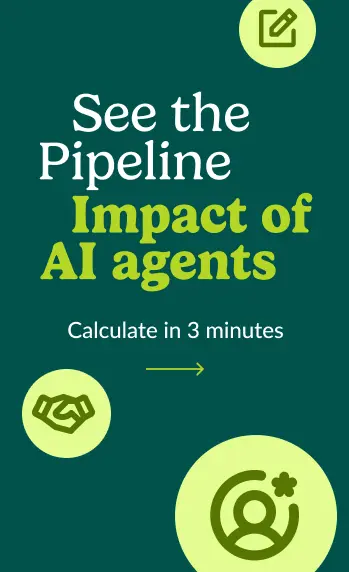AI Agents vs. Automation: What Sales Leaders Need to Know
Published:

The tools you choose now define how you’ll compete later. By 2028, Gartner predicts that 33% of enterprise software applications will include agentic AI, and 15% of daily work decisions will be made autonomously. But many platforms appear to be branding the same old features as “AI agents” without delivering real innovation.
Some people think automation and AI agents are interchangeable terms. They aren’t. Understanding the difference determines whether your team gets marginal efficiency gains or a meaningful edge in execution, forecasting, and revenue growth.
Let’s clear up confusion about AI agents vs automation
Automation executes processes with predefined and well-understood steps. Most revenue teams already automate activities like capturing customer data and personalizing messages.
What automation tools don’t do is make decisions or consider context. That’s where AI agents shine. They can assess live inputs, adapt to real-time situations, make decisions, and take action. Agents are more than just a productivity boost. They add a whole new operating layer for revenue teams.
What is an AI agent? What isn’t?
An AI agent does more than run CRM scripts or book discovery calls. It can reason and act independently based on intent, data, and context.
A real AI agent is:
- Embedded into seller workflows and shows up when needed
- Informed by contextual data, such as individual buyer signals, pipeline trends, and internal goals
- Capable of acting or recommending next steps without human intervention
Think of agentic AI as a digital operator that’s connected to your tools. It’s trained on your intelligence and focused on your goals.
It’s different from rules-based lead routing or a Slack bot that updates an Excel spreadsheet. AI agents can understand context and adapt to change. For example, they can generate truly personalized emails or deliver data-driven employee coaching based on individual behaviors.
Why agentic systems matter for revenue teams
Revenue teams are feeling the pressure. Sellers are burning hours on admin, research, and coordination. Managers are drowning in dashboards. RevOps is stuck stitching together disconnected tools. When overburdened teams need to do more, faster, specialized AI agents give them more leverage over their existing tools and processes.
Sales-trained AI agents can take action inside the workflow to capture, score, and surface insights automatically. They capture signals, prioritize actions, surface insights, and recommend next steps without being asked.
Salesloft’s agent approach: Real AI agents built for sellers
Salesloft’s AI agents are purpose-built to serve revenue teams where and how they work. They’re embedded directly into daily workflows, handling everything from simple tasks to complex decisions, without adding friction or requiring a process overhaul.
Our agentic AI isn’t here to replace your people. AI agents help sellers focus on building trust with prospects, moving conversations forward, and closing deals. Teams use them to increase capacity without adding headcount.
Some Salesloft AI agents run in the background, summarizing meetings and pulling sales methodology data from conversations. Others can surface insights at key moments to help reps act quickly. This flexibility lets teams scale AI across use cases without trading speed for control.
The result is better execution focused on revenue outcomes without interrupting your sellers’ workflows.
How to spot “agent washing”
Many vendors are giving the name “agent” to any “smart” tool they offer, including existing automation tools and LLM-powered chatbots. While a chatbot can send a templated email if a prospect asks, an AI agent can pull details from prospect accounts and send personalized, relevant messages.
When evaluating an agentic system, ask these questions:
- Does it make real-time decisions based on contextual data?
- Does it operate without being manually triggered?
- Can it function without rigid scripting?
If not, you’re looking at a marketing term, not an agentic system.
How to evaluate a real AI agent
You need your revenue tech to deliver value immediately. Any system can look impressive in a demo, but you have to be sure it will hold up in live workflows.
Here’s how to cut through the noise:
- Know who’s doing the work.
A real AI agent acts autonomously and takes specific workflow steps based on context, intent, and available data. If the system needs a human in the loop, it’s not an agent. - Check for autonomy.
True AI agents make decisions by themselves, within specified guardrails. If it needs manual oversight to run, it’s automation. - Ask how it learns.
Agents evolve and refine their behavior based on real outcomes, not just rules. If the product needs tuning or can’t show how its recommendations improve with use, it’s not an AI agent. - Test for explainability.
An AI agent surfaces not just the “what,” but the “why.” If the vendor can’t show you how a recommendation was derived, it lacks the transparency you’ll need to build trust and increase adoption rates. - Evaluate integration depth.
Agents can’t operate in a vacuum. They should connect directly to your CRM, comms tools, pipeline data, and internal systems. If the system requires manual uploads or disconnected workflows, it’s not operationally viable.
Look ahead: What we’re building next
We’ve already seen agentic AI drive real outcomes: context-aware prospecting, accelerated deal management, and closer alignment between marketing, sales, and customer teams. But we’re not stopping there.
Our next wave of AI agents will drive more value across revenue organizations. New capabilities will assist sellers with real-time account research, helping them quickly understand buyer roles and engagement history without toggling between systems. We’re also adding agents that generate dynamic deal summaries and surface insights, keeping sellers focused and managers aligned.
Look forward to coaching agents that learn from behavior patterns, call outcomes, and win rates to guide individual development. Identifying high-impact coaching moments and spotting performance risks early will turn daily workflows into continuous improvement loops at every level of the team.
AI agents aren’t optional for modern revenue execution. They’re already impacting how teams work, decide, and grow. And now that you can identify what agents are and can do for your team, you’re ready to get started.
Your next move matters. Invest in agentic AI that works.





























